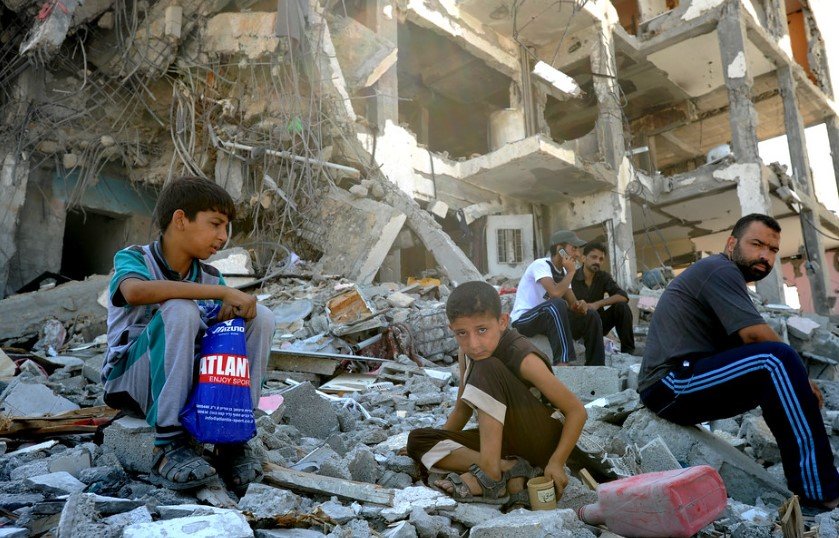Tensions Rise as Thousands of Palestinians Stranded in Northern Gaza
The ongoing conflict in Gaza has left thousands of Palestinians trapped in the northern region, unable to return to their homes as the war intensifies. A day after the second exchange of Israeli hostages for Palestinian prisoners in Israeli jails, the situation has grown even more precarious. With borders closed and lives at risk, former U.S. President Donald Trump has weighed in, urging neighboring countries like Jordan and Egypt to take action and offer refuge to those stranded.
The Delicate Hostage Swap and Its Aftermath
The hostage swap that took place on Friday sparked a mix of relief and concern. While families of the released prisoners celebrated, many were left questioning the broader implications of such exchanges. The agreement marked a critical moment in the long-standing tension between Israel and Gaza, with hopes for peace dashed by the ongoing uncertainty.
However, despite the exchange’s success, a growing number of Palestinians in northern Gaza remain trapped. Many had fled to the area in search of safety as conflict spread. Now, without a clear path home or a plan to move forward, they find themselves at the mercy of the situation. Desperation is mounting, and the international community is growing increasingly concerned about the humanitarian crisis unfolding.

Trump’s Urging for Regional Support
Amid the turmoil, former U.S. President Donald Trump has called on Jordan and Egypt to open their borders to the Palestinians stranded in Gaza. In a statement made earlier this week, Trump emphasized that the refugees should not be left to languish in the war zone but instead allowed to seek refuge in neighboring countries.
Trump’s remarks highlight the challenges facing the region as Israel’s military offensive shows no signs of letting up. Thousands of refugees in northern Gaza have nowhere to go, and the toll on human lives is growing with each passing day.
Trump’s call for Jordan and Egypt to act comes at a time when both countries are facing their own internal struggles. While Egypt has long been a key player in the peace talks surrounding Gaza, its involvement in this ongoing crisis is now more critical than ever. Similarly, Jordan, with its own Palestinian refugee population, is being urged to take a larger role in providing sanctuary.
The pressing need for neighboring countries to offer shelter to the displaced is now evident:
- Jordan and Egypt are geographically well-positioned to assist.
- Both countries have been historically involved in peace talks and diplomacy in the region.
- International pressure is mounting to avoid further loss of life.
While these efforts are important, questions linger about the capacity of these nations to absorb thousands of refugees without causing further strain on their already fragile resources.
The Human Toll and a World Watching Closely
As the waiting game continues in northern Gaza, the international community is closely monitoring the situation. Aid organizations have ramped up efforts to provide food, water, and medical care to those stuck in the region. Still, the sheer number of people trapped in limbo raises significant concerns about the long-term impacts on their wellbeing.
The psychological toll of the ongoing conflict cannot be overstated. For families caught in the middle, the constant uncertainty is unbearable. Many have already lost loved ones, and the prospect of losing more to the fighting is all too real. The appeal from Trump for regional solutions might be a lifeline, but it comes after months of broken promises and failed diplomacy.
Borders, Diplomacy, and the Future
In addition to the humanitarian aspects, the political ramifications of the situation are becoming more pronounced. Israel, Jordan, and Egypt all have vested interests in the outcome of the crisis. Israel seeks to maintain security in its borders, Jordan must contend with growing refugee numbers, and Egypt faces pressure from both its own citizens and the international community to act swiftly.
The ongoing blockade of Gaza has left little room for negotiation. Egypt and Jordan, both critical players in the peace process, are finding themselves in a delicate position. They must balance their diplomatic relationships with Israel while addressing the growing humanitarian needs of the Palestinians.
But will these nations take Trump’s advice and open their borders to those fleeing the violence? That remains to be seen, but the clock is ticking, and the eyes of the world are watching closely.
